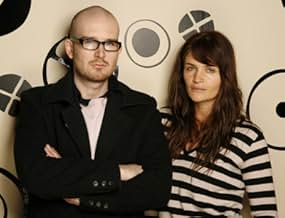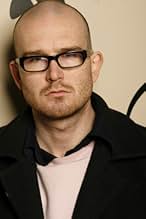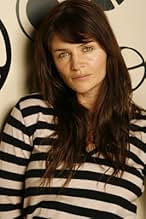Famous pianist Zetterström returns home to his native Denmark, to give a concert, just to find out that the choices he has made in his life have affected his love life greatly.Famous pianist Zetterström returns home to his native Denmark, to give a concert, just to find out that the choices he has made in his life have affected his love life greatly.Famous pianist Zetterström returns home to his native Denmark, to give a concert, just to find out that the choices he has made in his life have affected his love life greatly.
- Director
- Writers
- Stars
- Awards
- 1 win & 6 nominations total
Peder Thomas Pedersen
- Guard 1
- (as Peder Pedersen)
Susanne Storm
- Mor Til Dreng
- (as Susanne Storme)
- Director
- Writers
- All cast & crew
- Production, box office & more at IMDbPro
Featured reviews
Allegro is an ample Danish drama with redemption at its core, a film arriving with some extravagant ideas and some far reaching ambitions which, for the best part, combine reasonably well. The piece is a constructive and involving character study; a film with an uplifting politic at its core about identifying the importance of one's foundations and of where one came from and a film about the power of memory. Above all else, the film relies on a great deal of surrealism and generally off-kilter content to prop up what is a somewhat simplistic tale of one man returning to his roots so as to eventually confront past mistakes. In short, the surrealism here comes across heartfelt and necessary; it doesn't overwhelm the text as it does in something like Inland Empire. We, the audience, are not buried nor bombarded with a series of tricks or gimmicks – there are no near-unencryptable semiotics plaguing what might very well be a simple story simmering beneath the surface, although both shot and told by an individual too interested in bewildering and alienating. On the contrary, Allegro is passable science fiction applied to a digestible premise somewhat resulting in an enjoyable piece about a man returning to a place, in which he experienced mostly negative life experiences, to do good this time.
Ulrich Thomsen plays the adult incarnation of Zetterstrøm, a young boy from Copenhagen when we first see him, whose snow cone always comes loose from its foundation only to fall on the floor and whose rides on fair ground attractions pack up the moment he gets on them, such is the hard-luck nature of his childhood existence. During these opening segments, of which are nicely animated, he additionally happens upon two things: the equally young Andrea (Christensen) and the creating of piano music. Andrea is good to him; a beacon of light where there was dark. Zetterstrøm then proceedings to abruptly terminate one of these two things, specifically Andrea's presence, when he up's and leaves to pursue his musical career in America in a black hearted fashion.
As years roll by, and either party grow into adults; Zetterstrøm doing well as a musician in his field, Andrea staying where she is, something mysterious befalls a district of their childhood stomping ground, the Danish capital. Principally, a bizarre field of energy causes global news when it lands and both engulfs as well as surrounds a section of the city, thus trapping the people already in there and stopping those on the outside from entering. This part of Copenhagen is re-branded "The Zone", a place terrorising its inhabitants on arrival with bright reds and blue hues flashing around uncontrollably and housing what appears to be diegetic music sounding like the sort of stuff Steve Roach might compose on an off day.
Fittingly, Zetterstrøm is due to return to Copenhagen for a concert stop; he departs America for Europe again, checking himself in his New York City hotel mirror in what is a telling moment of self-reflection in a literal sense with room to grow into a metaphorical one. Later, he will have to confront his own reflective self upon entering this "Zone" when the entering through a restroom mirror takes place. It is here the film mutates into a tale telling of his return, his curiosity and his uncanny interactions with an array of people; not least a glasses wearing man of some age whom seems to think getting Zetterstrøm into The Zone by any means would be a good idea. Further links to the aforementioned Lynch, creator of Inland Empire, rear up here when we think back to a similar character in his 2001 film Mullholland Dr. The writer/director for Allegro, a certain Christoffer Boe, whose ideas here frustratingly outweigh execution, at this point pumps his film with as much life as it ever possesses throughout; paying meek homage to Andrey Tarkovskiy's 1972 film Solyaris and eventually formulating his piece into a film about a guy heading into the unknown to try and tackle why it is certain things are happening - the stumbling across items much more personal and affecting than he first envisaged additionally rearing up.
Allegro is good value for what it is, a story we are able to wrap ourselves up in; off-the-wall content which does what it's supposed to do and remain looming in the background as this central tract of a man righting wrongs takes centre stage. The sense of there being this respective infrastructure to a creative, avant-garde element inserted into proceedings which has its own effect on surroundings we are familiar with feels additionally persistent. There is enough of a sense of adventure as he attempts to seek Andrea, flitting between the inner and outer Zone locale, and whilst the film does not have the power nor the majesty I think it perhaps deserved, Boe strikes us as a creative and enthusiastic filmmaker – the sort of person unafraid of setting bars high but at the same time, both eager and able enough to stick to rigid ground level ideas of character study and generic frills. Here, they total up into a substantial film watching experience.
Ulrich Thomsen plays the adult incarnation of Zetterstrøm, a young boy from Copenhagen when we first see him, whose snow cone always comes loose from its foundation only to fall on the floor and whose rides on fair ground attractions pack up the moment he gets on them, such is the hard-luck nature of his childhood existence. During these opening segments, of which are nicely animated, he additionally happens upon two things: the equally young Andrea (Christensen) and the creating of piano music. Andrea is good to him; a beacon of light where there was dark. Zetterstrøm then proceedings to abruptly terminate one of these two things, specifically Andrea's presence, when he up's and leaves to pursue his musical career in America in a black hearted fashion.
As years roll by, and either party grow into adults; Zetterstrøm doing well as a musician in his field, Andrea staying where she is, something mysterious befalls a district of their childhood stomping ground, the Danish capital. Principally, a bizarre field of energy causes global news when it lands and both engulfs as well as surrounds a section of the city, thus trapping the people already in there and stopping those on the outside from entering. This part of Copenhagen is re-branded "The Zone", a place terrorising its inhabitants on arrival with bright reds and blue hues flashing around uncontrollably and housing what appears to be diegetic music sounding like the sort of stuff Steve Roach might compose on an off day.
Fittingly, Zetterstrøm is due to return to Copenhagen for a concert stop; he departs America for Europe again, checking himself in his New York City hotel mirror in what is a telling moment of self-reflection in a literal sense with room to grow into a metaphorical one. Later, he will have to confront his own reflective self upon entering this "Zone" when the entering through a restroom mirror takes place. It is here the film mutates into a tale telling of his return, his curiosity and his uncanny interactions with an array of people; not least a glasses wearing man of some age whom seems to think getting Zetterstrøm into The Zone by any means would be a good idea. Further links to the aforementioned Lynch, creator of Inland Empire, rear up here when we think back to a similar character in his 2001 film Mullholland Dr. The writer/director for Allegro, a certain Christoffer Boe, whose ideas here frustratingly outweigh execution, at this point pumps his film with as much life as it ever possesses throughout; paying meek homage to Andrey Tarkovskiy's 1972 film Solyaris and eventually formulating his piece into a film about a guy heading into the unknown to try and tackle why it is certain things are happening - the stumbling across items much more personal and affecting than he first envisaged additionally rearing up.
Allegro is good value for what it is, a story we are able to wrap ourselves up in; off-the-wall content which does what it's supposed to do and remain looming in the background as this central tract of a man righting wrongs takes centre stage. The sense of there being this respective infrastructure to a creative, avant-garde element inserted into proceedings which has its own effect on surroundings we are familiar with feels additionally persistent. There is enough of a sense of adventure as he attempts to seek Andrea, flitting between the inner and outer Zone locale, and whilst the film does not have the power nor the majesty I think it perhaps deserved, Boe strikes us as a creative and enthusiastic filmmaker – the sort of person unafraid of setting bars high but at the same time, both eager and able enough to stick to rigid ground level ideas of character study and generic frills. Here, they total up into a substantial film watching experience.
Inspired by having seen the provocative Reconstruction last year, I watched Allegro last night and found it to be just spectacular. I think Boe is one of those amazing Renaissance people, whose skills crossover like blossoming fireworks.Above all else, I appreciate his concepts, which become his story lines.Supporting them is his very idiosyncratic visual style. The film is dark and moody, like its protagonist, and there is little dialogue. Long contemplative shots are frequently interrupted by a barrage of split-second images- the equivalent of memory flash cards. The cartoon story that plays during the film's introduction- tells the simple story one is about to see unfold. It's basically a one sentence story about the necessary role that deep feelings play in the life of any great artist. I see that simple story as a spider, and the ensuing film as the web around the spider. I particularly like it that the narrator clearly tells us, at the very beginning, what the film is about, and then we spend the next hours watching that spider web be built and travelled. What a fascinating world Boe creates.
I must say I am very surprised to have not seen much IMDb discussion of this film . I only hope that many more people will soon have the pleasure of its experience.
I must say I am very surprised to have not seen much IMDb discussion of this film . I only hope that many more people will soon have the pleasure of its experience.
I'm a big fan of existential folly in film, especially having completed many of my own. Zetterstrøm is the main character in this movie, a world-renowned pianist from Denmark. Since childhood, he is an assiduous "forgetter" of everything except his piano playing. This is to say that he stores up his disappointments, forgets them, and retreats behind a piano. After a love affair that ends due to his emotional constipation, he uses his facultative amnesiac skills once again, and this act is one step too far, so inimical to the fabric of reality, that a rent in reality is formed over three city blocks, and becomes referred to as the "Zone".
Zetterstrøm buries himself in his solitary existence of piano-playing, quite literally performing concerts in the dark, or behind screens so that the audience cannot see him. Shadowy figures draw Zetterstrøm back to the zone, unwilling to allow his non-confrontational existence to continue. Zetterstrøm must be made to confront his past.
It's a fascinating film, the narrator lets us know that it's Zetterstrøm's very brilliance which allows him to annihilate himself, that allows him to inoculate himself from reality.
I'm in absolute adoration of films that attempt to make visual metaphors of the human mind, such a film is this (the Zone fulfils this purpose), Tarsem films such as The Cell and The Fall are others. There is no subject more sacred, more revelatory as regards human potential. There's a scene where Zetterstrøm sits and has dinner in an ornately plastered ballroom. The windows and floor are all blacked out with plastic sheeting, and the room is covered in latched boxes loaded on pallets, representing Zetterstrøm's repressed past, there's also a cage with globes of light in, recognising the potentiality of his mind.
When there's narration we also see some very nice cartoons with Zetterstrøm as a child, that's another metaphor I'm very fond of from The Cell, that many of us are still children inside, just wounded, subdued, and with horrid barriers put up. You may have guessed that this movie moved me deeply.
Zetterstrøm buries himself in his solitary existence of piano-playing, quite literally performing concerts in the dark, or behind screens so that the audience cannot see him. Shadowy figures draw Zetterstrøm back to the zone, unwilling to allow his non-confrontational existence to continue. Zetterstrøm must be made to confront his past.
It's a fascinating film, the narrator lets us know that it's Zetterstrøm's very brilliance which allows him to annihilate himself, that allows him to inoculate himself from reality.
I'm in absolute adoration of films that attempt to make visual metaphors of the human mind, such a film is this (the Zone fulfils this purpose), Tarsem films such as The Cell and The Fall are others. There is no subject more sacred, more revelatory as regards human potential. There's a scene where Zetterstrøm sits and has dinner in an ornately plastered ballroom. The windows and floor are all blacked out with plastic sheeting, and the room is covered in latched boxes loaded on pallets, representing Zetterstrøm's repressed past, there's also a cage with globes of light in, recognising the potentiality of his mind.
When there's narration we also see some very nice cartoons with Zetterstrøm as a child, that's another metaphor I'm very fond of from The Cell, that many of us are still children inside, just wounded, subdued, and with horrid barriers put up. You may have guessed that this movie moved me deeply.
I have to say that the strength of this movie is it's simplicity. It's beautiful in a very obvious way which really hits you right in the eye. The whole movie has some sort of delicate aura draping it and although the acting, as stated by other reviewers, is not a state of the art, the music and the very beautiful footage makes this a film well worth seeing.
The story is not complicated at all. It uses a lot of symbolism and the movie writer is obviously trying to trigger our imagination by jumping in time and place (in the same style as many filmmakers before him such as Spike Jonze and Michael Gondry) trying to make the moral statement of the film looking more complex than it really is.
This is a beautiful movie, it has some original touches such as the drawn episode and hopefully you will leave the cinema feeling the same way as I did, with a warm feeling inside and the beautiful music still playing in my ears.
The story is not complicated at all. It uses a lot of symbolism and the movie writer is obviously trying to trigger our imagination by jumping in time and place (in the same style as many filmmakers before him such as Spike Jonze and Michael Gondry) trying to make the moral statement of the film looking more complex than it really is.
This is a beautiful movie, it has some original touches such as the drawn episode and hopefully you will leave the cinema feeling the same way as I did, with a warm feeling inside and the beautiful music still playing in my ears.
I went out from the cinema crying. The movie, as all movies in my opinion, removes inside you what you let be removed... I am only 28, and yet, this movie reminds me of how many memories I want to hide, forget, just because my life is based on "keep on living, keep on acting as you decided, don't turn back, because this is imperfection". I don't think the movie is excellent, but it has a specific message (art is made of passion and passion is made of each one's history) and it knew how to express it, how to deal with this psychological side each one of us has. Also the music, mainly J.S. Bach, is beautiful. This is the kind of movie that I would call "of the moment", maybe you won't remember it in a few months, but it inspires you and lives with you unconsciously as a psycho therapy does.
Did you know
- Quotes
Zetterstrøm: - But what now... now that I regret?
Tom: - It's a bit late for that, I am afraid.
Zetterstrøm: - So, what do I do now?
Tom: - Well, you can go back to your music, if you want.
- ConnectionsReferenced in iChat mellem Boe og Wulff (2006)
Details
Box office
- Budget
- DKK 10,000,000 (estimated)
- Gross US & Canada
- $7,404
- Opening weekend US & Canada
- $505
- May 13, 2007
- Gross worldwide
- $10,208
- Runtime
- 1h 28m(88 min)
- Color
- Sound mix
- Aspect ratio
- 2.35 : 1
Contribute to this page
Suggest an edit or add missing content































